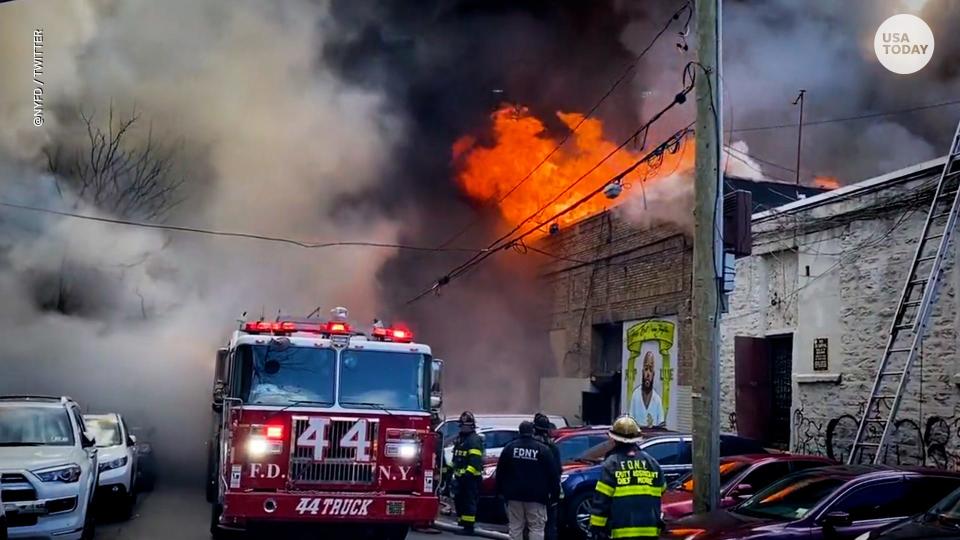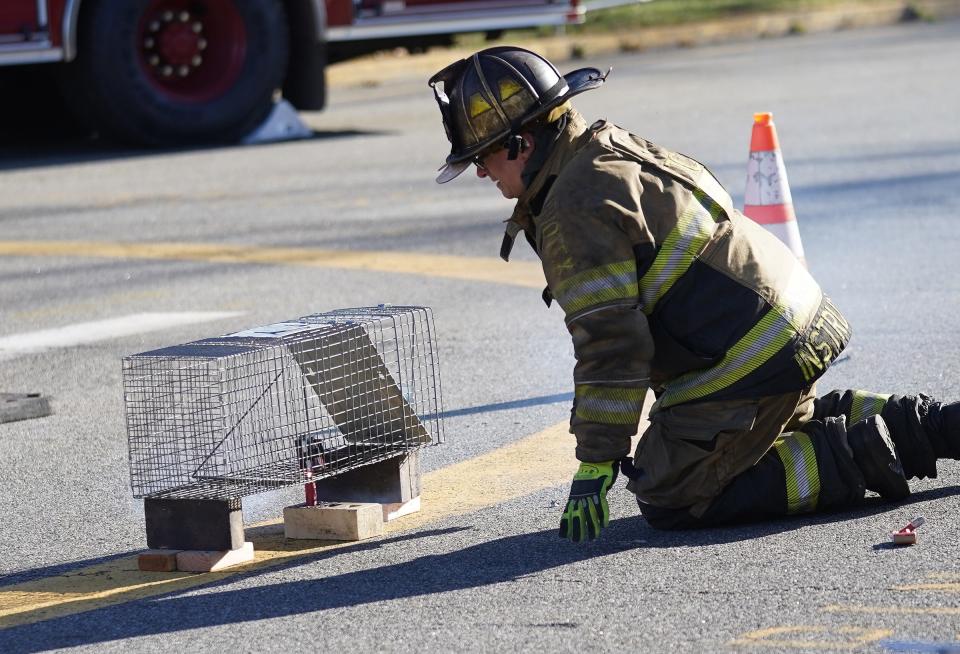What to know about lithium-ion batteries, which caused Friday's deadly Harlem fire
- Oops!Something went wrong.Please try again later.
Friday's apartment fire in Harlem — which killed a journalist living there and left others with critical injuries — was the latest blaze caused by a lithium-ion battery.
Only weeks ago, New York City Fire Commissioner Laura Kavanagh warned that lithium-ion batteries have become a leading cause of fires and fire deaths in the city.
With increasing regularity, the batteries have made headlines for the fires they've caused, spurring public information campaigns and responses from local governments. Experts say these fires are particularly deadly and videos show why: batteries can spontaneously burst into flames.
Videos posted by the FDNY show lithium-ion batteries in apartment lobbies and other public places erupting quickly and setting fires ablaze. A lithium-ion battery on an e-bike caused the Harlem fire, fire officials told USA TODAY.
"Make sure any device you have in your home, whether an e-bike or something else powered by a lithium-ion battery, is safe and you can guarantee you and your family are safe when you buy something from a store or from an online retailer," Kavanagh said at a public safety briefing Feb. 2.

The lone fatality from Friday's fire was Fazil Khan, 27, an Indian national and data journalist. He worked for The Hechinger Report, a respected site for education news, and The City, a nonprofit new operation covering New York City.
In 2019 and 2020, New York City saw no deaths from lithium-ion battery fires, according to the FDNY. Last year, 17 people in New York died from lithium-ion battery fires, the fire department told USA TODAY. That was up from 2022, which saw six deaths, and 2021, which saw four deaths from the battery fires, the department said.
Here's what to know about lithium-ion batteries, the dangers they pose and how to stay safe.
"They're very temperamental," said Neil Caputo, director of Westchester County Fire Services Division of its Department of Emergency Services.
What are lithium-ion batteries?
Lithium-ion batteries were developed in the early 1970s and have since become ubiquitous in everyday products, from cellphones and laptops to e-bikes, scooters, electric vehicles and lawnmowers. Some of these items use lithium-ion batteries, which are rechargeable, while others use lithium batteries, which are disposable.
Compared to other batteries, "They store at least double the energy. They're half the weight, half the size," said Stanley Whittingham, a distinguished professor of chemistry and materials science at Binghamton University.
Whittingham won the Nobel Prize in chemistry in 2019 with John B. Goodenough and Akira Yoshino for their work in developing the lithium-ion battery.

But the same reason the batteries are so effective − higher energy density − is the same reason they can be so deadly, said Susan Spear, deputy commissioner of Westchester's Department of Emergency Services.
Lithium-ion batteries started to dominate many products in the 2000s, Whittingham said, but in the past five to 10 years they started showing up in other products, such as lawn and garden tools.
"The real issue is we're getting cheap, bad batteries," Whittingham said. Poor quality batteries manufactured overseas and sold for cheap rates pose more of a safety concern.
More: Prevent fires with lithium ion battery safety. Here's how to store, dispose
Getting the word out about safe battery use
Lithium-ion batteries have had damaging and sometimes deadly consequences.
In recent years, recycling plants across the state have also been confronted with the risk. An improperly tossed battery caused a five-alarm fire at a recycling plant in Queens in early 2018, and is believed to be the cause of a massive blaze that ripped through cubes of recycled materials at a facility in Tioga County, near Binghamton, in early 2020.
Spear also noted that these fires are more deadly, noting their explosive nature.

Westchester has been taking on the problem in several ways: training firefighters, doing public outreach, particularly to landlords, tenants and bicycle shops, and looking at legislation at every level. Additionally, the county is advocating for the ability to track fires from lithium-ion batteries in the National Fire Incident Reporting System.
Whittingham said all levels of government should ban batteries that aren't UL-approved, which means products have been tested by Underwriters Laboratories and met safety standards.
How to handle lithium-ion batteries safely
New York City and Westchester County officials and Whittingham listed several ways people can safely use lithium-ion batteries:
Don't charge devices such as cellphones under pillows or in bed.
Charge devices away from doorways or windows so as not to block an exit in a fire.
Only use devices that have the UL mark showing they've been tested and are safe.
Use charging cords that came with the device.
Charge scooters and e-bikes while someone is awake and present in case the devices ignites.
Replace batteries if damaged or not working properly.
Only charge batteries at room temperature. Keep them out of direct sunlight and hot vehicles.
Take used batteries to designated collection sites, like your municipal recycling center or even a local electronics store. Do not throw them in the trash. In Westchester, batteries should be taken to the Household Material Recovery Facility.
This article originally appeared on Rockland/Westchester Journal News: Lithium-ion battery caused deadly Harlem fire what to know about safety

